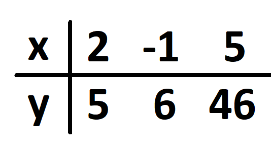Global Math Project Experiences
3.6 Fitting Quadratics to Data
The video of lesson 3.5 reviews this material.
Sometimes students are asked to find a quadratic formula \(y=ax^2+bx+c\) to fit three data points. Lagrange’s Interpolation formula works very well for this. The task of simplifying the formula one gets (if one is required to simplify answers) is not too onerous.
Practice 1: a) Show that \(y=7\dfrac{\left(x-4\right)\left(x-5\right)}{\left(-5\right)\left(-6\right)} + \dfrac{\left(x+1\right)\left(x-5\right)}{\left(5\right)\left(-1\right)} + 10\dfrac{\left(x+1\right)\left(x-4\right)}{\left(6\right)\left(1\right)}\) is a quadratic equation in disguise. Show that the graph of this equation passes through the data points \((-1,7)\), \((4,1)\), and \((5,10)\).
b) Find a quadratic formula that fits the data \((2,5)\), \((-1,6)\), and\((5,46)\) and make your answer look as friendly as possible.

c) Find a quadratic formula that fits the data \((2,5)\), \((3,8)\), and \((5,14)\) and make your answer look as friendly as possible. Explain what happens!
d) There is no quadratic formula \(y=ax^2+bx+c\) that fits the data \((2,5)\), \(10,6)\), and\((10,100)\). (The same input value of \(x=10\) cannot give two different output values.) So then, how does Lagrange’s Interpolation method fail when you try to use it?
Of course, from the previous lesson we know how to find a polynomial that fits any number of data points, not just three.
Practice 2: Use Lagrange’s Interpolation Formula to find the equation of the line between two points \((p,m)\) and \((q,n)\) with \(p \neq q\). Is your equation equivalent to “\(y=mx+b\)” where \(m\) is the slope of the line segment between the two points?
Resources
Books
Take your understanding to the next level with easy to understand books by James Tanton.
BROWSE BOOKS![]()
Guides & Solutions
Dive deeper into key topics through detailed, easy to follow guides and solution sets.
BROWSE GUIDES![]()
Donations
Consider supporting G'Day Math! with a donation, of any amount.
Your support is so much appreciated and enables the continued creation of great course content. Thanks!
Ready to Help?
Donations can be made via PayPal and major credit cards. A PayPal account is not required. Many thanks!
DONATE![]()


